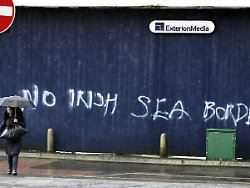Thursday February 11, 2021
Saber rattles before the crisis meeting
EU accuses British failures
A few hours before a meeting between EU Commission Vice President Maros Sefcovic and British Minister of State Michael Gove, Brussels is tightening the tone. London, too, had not saved with provocations before and is now "disappointed".
The EU accuses Great Britain of failing to implement Brexit agreements. In a letter to British Minister of State Michael Gove, EU Commission Vice-President Maros Sefcovic criticized the failure to comply with agreements to control the movement of goods and people between Northern Ireland and other parts of the United Kingdom. He also criticizes the misinformation from traders and the lack of access by EU representatives to customs data. Sefcovic writes that he assumes that there are teething problems for which quick solutions can be found.
The letter is explosive because the EU Commission deputy had it published just a few hours before a meeting with Gove in London. The British side wants to vigorously advocate easing the so-called Northern Ireland Protocol this Thursday in order to cushion the negative effects on the economy. For example, in a letter that was also not very squeamish, Gove called for considerably longer transition periods – and otherwise threatened with "all available means".
A government spokesman in London said in response to Sefcovic's letter that evening that it was "disappointing" that the EU Commission has not been able to recognize "the shock and anger" in Northern Irish society it has caused with their decision to trigger an emergency mechanism in the Northern Ireland Protocol to the Brexit Agreement. Brussels also failed to take note of the fact that "urgent steps to restore confidence" had become necessary.
Fragile Peace in Northern Ireland
The protocol provides for the island to remain a common economic area and for Northern Ireland – unlike the rest of the United Kingdom – to continue to apply the rules of the EU internal market and customs union. Therefore, controls should now be carried out at the ports when goods come by sea from Great Britain, for example to Belfast in Northern Ireland. This creates a goods border between Northern Ireland and the rest of the kingdom.
In the dispute over vaccine deliveries, Brussels briefly considered removing Article 16 from the protocol, which could temporarily override parts of the regulation. This was seen as the willingness of the EU to accept controls at the inner-Irish border. Brussels rowed back quickly, but the damage was already done. The main objective of the protocol is to prevent controls between the EU country Ireland and the British Northern Ireland. Such controls could shake the fragile peace process in Northern Ireland. There advocates of union with Ireland and supporters of union with Great Britain had fought a bloody civil war for decades.
During the Brexit negotiations, London had long speculated that the EU would agree not to carry out any goods checks. For the EU, however, this would have been a dangerous precedent and a back door for goods that could have been smuggled unnoticed from the United Kingdom via Ireland into the European internal market and the customs union. It is possible that the British will now smell a second chance.
.
